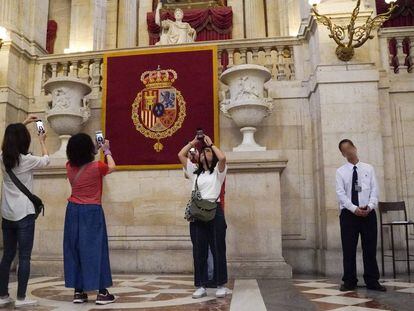Meet the Spanish deafblind man who has invented a new sign language
Taking his disabilities in his stride, 37-year-old Sergio Romero has set up a platform to offer the 7,000 Spaniards who live with a similar condition an alternative form of communication

An illness left Sergio Romero deaf, and with mobility and sensation problems, when he was five years old. At age 29, a back injury left him a paraplegic, and when he was 33, he lost his sight after suffering from pneumonia. But none of this has dampened his zest for life. Together with his carer, Cristina Álvarez Castellanos, Sergio has invented a new sign language, which is available on an online platform to anyone who may find it useful.
“I am a positive person and I have a strong character. This illness has only made me stronger. You could say that it has opened my eyes. Now I can see more than before,” the 37-year-old from Murcia tells EL PAÍS. Sergio has a five-year-old daughter, and currently studies journalism and documentation science.
This illness has only made me stronger Sergio Romero
Before meeting Cristina, a carer from the ONCE Foundation for the Care of Persons with Deafblindness (FOAPS), Sergio communicated by tracing capital letters on his forehead with his index finger. “I wanted to use a faster system and then it occurred to us to adapt the Spanish sign language by transferring the signs to my face, shoulders and neck,” where he has more feeling.
Because some of the signs couldn’t be adapted, they started to make up their own. “It reminds me a bit of mime. For example, for the word ‘to dance,’ you put your two hands on the sides of your face and move them, like if my face was dancing. It's a mime based on touch,” he explains.
Sergio and Cristina started to create the language – which they have called SERCRI (a combination of both their names) – in 2017. Since then, they have “invented words every day.” They have around 500 words, according to Cristina, although Sergio insists it’s closer to 1,000. This was the only time they disagreed during the interview. “We’ll count them this afternoon,” Cristina says.
Sergio makes it clear than he doesn’t want to “impose” his communication system on anyone, only offer it as an alternative language to those in a similar situation to him. There are around 7,000 deafblind people in Spain. It is a very diverse group, and they have very different ways of communicating. “They tend to be people who are very isolated, it's not a well-known disability and there are many differences and degrees to it,” Cristina points out.
Since 2017, Sergio and Cristina have “invented words every day”
Sergio, who before becoming blind had studied software programming, has launched the platform Esquivando Barreras (or Overcoming Barriers) on Facebook, YouTube and Instagram, which regularly shares videos on how to interpret SERCRI signs. In addition to offering an “alternative form of communication,” Sergio and Cristina’s objective is “to help people in the same situation, to try to stop them getting depressed, to let them know that all is not lost.”
But Sergio’s projects do not stop with SERCRI – his life's dream, he says, is to set up a foundation to help more people who are deafblind. The main problem is money: “I’m playing the [sports betting game] La Quiniela,” he jokes. But he is serious about launching a petition to call on Spain’s politicians to “become aware the difficulties that people with disabilities face.”
“No one can live off a €380 pension. Many of us have a family to support and have to spend a lot on medication and assisted-living devices. Let them think about that before they raise their salaries,” he says.
Sergio also wants more time with carers. Cristina currently helps him eight hours a week. She spends three hours with him when he is at university, and the rest of the time at his home, teaching his wife and daughter SERCRI, while also reading and responding to his emails, interpreting messages and working on their platform. If he had a choice, he says, Cristina would be with him for eight hours a day.
English version by Alicia Kember.












































